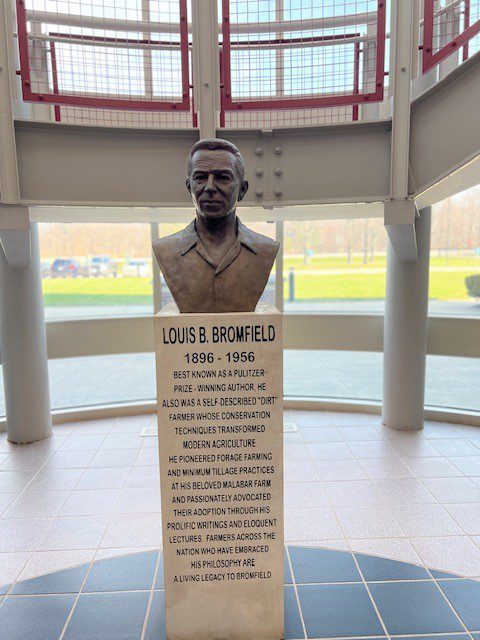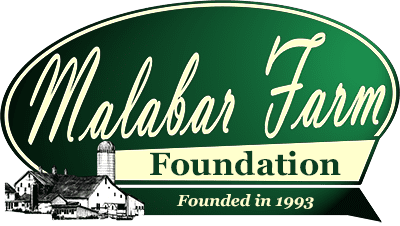Louis Bromfield’s Legacy: Sowing the Seeds of Sustainable Agriculture
Louis Bromfield was one of the early founders of methods used in organic food production. He dedicated Malabar Farm to education about sustainable farming.
“As soils are depleted, human health, vitality and intelligence go with them.” – Louis Bromfield

This quote, perhaps more than any other, embodies the essence of Louis Bromfield’s message about the urgent need to find new farming methods that would not leave the nation’s soils barren and depleted. When Bromfield moved back to the area near his Mansfield, Ohio, childhood home, America was at the end of the Great American Dustbowl. Modern farming practices had stripped the land throughout the grain belt of the United States to the point where enormous dust storms stripped the topsoil and carried it away, rending the land unable to grow the food that was so badly needed.
When Bromfield bought the farms that would eventually become Malabar Farm, major sections of the land were heavily eroded. Bromfield made it his mission to restore the soil to productivity and to educate others on how to fix the problem that they faced. Malabar Farm would become a working and teaching farm where Bromfield insisted on techniques, such as using cover crops, large-scale composting, contour plowing, and other methods that are now the foundation of sustainable agriculture.
Bromfield was inspired by contemporaries that included Paul Sears, Aldo Leopold, Edward Faulkner, and Hugh Hammond Bennett. These leaders knew the importance of avoiding the practices that led to soil degradation in the past. They knew that it was essential to give soil top priority if they wanted to maintain productivity in the years to come. The methods of sustainable agriculture have changed over the years, but the work of Bromfield and his contemporaries laid the foundation.
The most important lesson learned by the techniques used at Malabar Farm is the critical role that soil health plays in maintaining the system. Bromfield used grasses and legumes with deep roots as fodder for the animals. This system prevented soil erosion and returned fertility to the soil over time.
Soil is like a bank account. You cannot keep making withdrawals without putting something back in. If you do not make regular deposits in the way of nutrients, minerals, and helpful bacteria, eventually, the account will have nothing in it. The result is soil that will not sustain life and produce the food that we need. Unfortunately, in recent years, farmers have begun to drift back to unsustainable practices.
Bromfield said,
“Soil, water and forests are the foundation not only of our national economy but of our very existence and civilization.”
This is something that we cannot forget, especially as the world faces the challenges of climate change and how to feed a growing population with limited resources. If Bromfield were alive today, his views would probably not have changed. This is what he had to say about such issues.
“If what we already know were simply applied to all the agricultural land of the world and the problem of proper distribution were given consideration, the world could feed itself well.”
Bromfield not only practiced sustainable methods at Malabar Farm, but he was a strong advocate and testified in Congress about the importance of sustainable methods. Unfortunately, his message fell on deaf ears, according to Bromfield biographer Stephen Heyman.
Bromfield only used fertilizer as a last resort and relied on composting, crop rotation, and other sustainable methods to produce food grown on the farm. He was a strong advocate against the commercial use of DDT. His message came out over a decade before the book Silent Spring by Rachel Carson. One could say that he was a man ahead of his time.
Bromfield echoed what advocates of the organic movement know today. He knew that there were no shortcuts when improving the soil and once said,
It might be a surprise to modern readers that Bromfield was not necessarily a proponent of what we now know as the modern organic movement. Although much of the food that was produced for sale at the produce stand would be considered organic, he never advertised it as such. However, he did believe that it was higher quality than that produced by conventional farming methods and did not hesitate to charge a premium.
Bromfield was a visionary and did not like where the American food supply and modern agriculture were headed, but he would have never identified with the “Organic” movement in his time. In fact, he once got into an argument with Jerome Irving Rodale, founder of the Rodale Institute, in which it expressed his resistance to the national organic label. (1)
You have to understand this in context. The 1940s and 1950s were different times. The organic movement back then was considered radical and many people thought of it as a counterculture or subculture. Fortunately, this stereotype has eased over the years and the term “organic” no longer has the cultural implications that it did in Bromfield’s time. Even though many consider Bromfield to be one of the founders of the organic movement, he would have never identified himself as such during his time.
Bromfield was proud of the roadside stand constructed of local sandstone where he sold his produce. He limited the use of dusts and sprays, and his products were not always compliant with modern Organic standards. People began to realize that Bromfield’s products were high-quality, and they were interested in the concept of more natural produce. The business began to grow and expand. They frequently sold out of produce.
Bromfield received the Audubon “Medal of Conservation” for his work in agriculture. He was posthumously entered into the Ohio Agriculture Hall of Fame. If you want to learn more about Bromfield’s philosophy about sustainable agriculture and the thought process behind Malabar Farm, you might want to pick up a copy of Pleasant Valley, written by Louis Bromfield in 1945.
References
- Heyman, Stephen. (2020). The Planter of Modern Life: and the Seeds of a Food Revolution. W.W. Norton & Company.
- Kloosterman, Stephen. (2020, June 9). “Louis Bromfield’s roots paved the way for organic agriculture.”https://vegetablegrowersnews.com/article/louis-bromfields-roots-paved-the-way-for-organic-agriculture/
